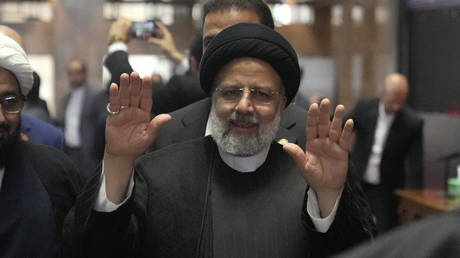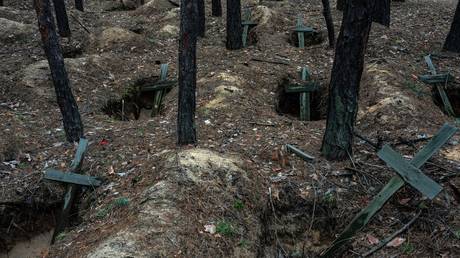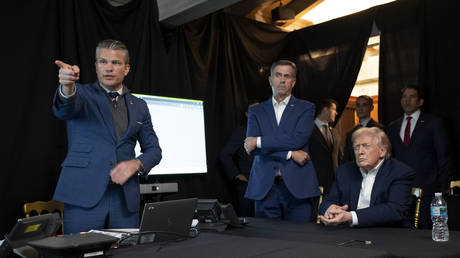
Tehran’s improving international status and sanctions-resistant economy are what really bothers Western powers
The G7’s concern over Iran’s nuclear programme parrots a decades-old WMD conspiracy theory, aimed at drumming up public support for anti-Iranian action that is really aimed at curtailing Tehran’s conventional weapons programme, regional alliances and the development of stronger ties with Moscow.
After the meeting between the Group of Seven (G7) leaders in May, a number of announcements were made on the trajectory of the alliance. Germany, France, the UK, the US, Japan, Canada, and the European Commission all agreed to take measures to reduce trade reliance on China. They also agreed to advance their commitment to Ukraine’s war budget, while pledging to combat Iran’s influence in the Middle East. The agenda platform, set out from the Japanese city of Hiroshima, seeks to further exacerbate the schisms between major world and regional actors in the emerging multipolar order.
Tehran has long been the target of Western ire and sanctions, and until recently was locked in a rivalry with its Persian Gulf neighbor Saudi Arabia. However, as the US and its allies focus their efforts on combating Russia and China, this has presented opportunities for the less powerful Iran to survive under sanctions.
On May 17, Russian President Vladimir Putin and his Iranian counterpart Ebrahim Raisi signed a deal to finance the construction of an Iranian rail route that aims to supplement the international North-South Transport Corridor. It also emerged this month that 28 Russian energy companies plan to visit Iran, seeking to increase cooperation with and potentially help in advancing Iran’s oil and gas industry. These two developments add to the growing cooperation between the world’s two most sanctioned nations, both of which have proven themselves capable of finding alternatives to the West and circumventing the intended effects of its sanctions.
It is in this context that the conspiracy theories about Iran’s alleged pursuit of a nuclear weapon have emerged again in Western discourse. The G7’s draft communique on the issue expressed the nations’ concerns “about Iran’s unabated escalation of its nuclear programme,” while reiterating the “clear determination that Iran must never develop a nuclear weapon.” However, the assertions about Iran’s nuclear programme were also accompanied by the following sentence:
“We express our grave concern regarding Iran’s continued destabilising activities, including the transfer of missiles, unmanned aerial vehicles (UAVS) and related technologies to state and non-state actors.”
Western officials have a long track record of wrongly predicting Iran’s development of an atomic bomb, offering false speculation about when Iran will have one whenever a separate major issue pops up. Now that Russia-Iran ties are developing, Tehran-Riyadh rapprochement has been brokered by Beijing, and the sanctions have failed to bring about regime change, it seems there is a build-up to another push to condemn the Iranian government on an issue which the Western world can unite over.
Earlier in May, UK foreign secretary James Cleverly told Fox News that “preventing Iran from developing a nuclear weapon remains an absolute priority in UK foreign policy,” going on to say that Britain continues to work “very, very closely” with Germany, France and the US to impose sanctions on Iran. And no talk of Iranian nuclear weapons would be complete without an Israeli official chiming in. Israel’s Defense Minister Yoav Gallant claimed that Tehran now has enough uranium for five nuclear weapons.
Since 1992, Israeli officials have been constantly making false claims and predictions on how long it will take for Iran to build a nuclear bomb, with former Israeli President Shimon Peres first warning the international community “that Iran would be armed with a nuclear bomb by 1999.” Back in January of 2021, former IDF chief Aviv Kochavi even made the claim that the nukes could be developed in “months, maybe even weeks.”
In reality, there is no proof that Iran has a secret nuclear weapons program, nor is there any evidence to suggest Tehran is seeking to develop the bomb, let alone use it. At this point, after the deadlines set by the countless predictions have passed, the current talk amounts to little more than a fact-free conspiracy theory. Thinking rationally about it, it would make no sense for Iran to use a nuclear weapon either, in the event that it actually is seeking one, especially not against Israel, as this could end up destroying the third-holiest site in the Islamic faith.
There are, however, a number of ways that Iran presents a clear and present threat to the West’s agenda in the Middle East. The first and most immediate threat comes through its defense industry. Iran now produces sophisticated drones and missiles that are capable of doing significant damage to NATO and Israeli forces in the Middle East, if need be. Additionally, Tehran has allies like Hezbollah in Lebanon, Hamas in Palestine, Ansarallah (the Houthis) in Yemen, Kataeb Hezbollah in Iraq, and many others, who remain powerful in their own given arenas.
Lastly, it is clear that Iran is now on track for a brighter future economically. It has managed to end its hostility with Saudi Arabia, and this has meant that their competition inside a range of Middle East nations has eased. These strides toward regional stability have been coupled with developing relations between Tehran and Moscow. Iran also agreed on a potential $400 billion deal with China, announced back in 2021, which at the very least opened the door for further cooperation and investment.
At a time when the US and its European allies are focusing heavily on combating both China and Russia, it is a great frustration to witness Iran, their top Middle East foe, come together with their enemies. This is why the issue of nuclear weapons has come up again. Not that Western nations, armed to the teeth with nuclear weapons themselves, are in any position to tell others what to do – but it is clear that the question of an imminent Iranian WMD is not a serious one.




